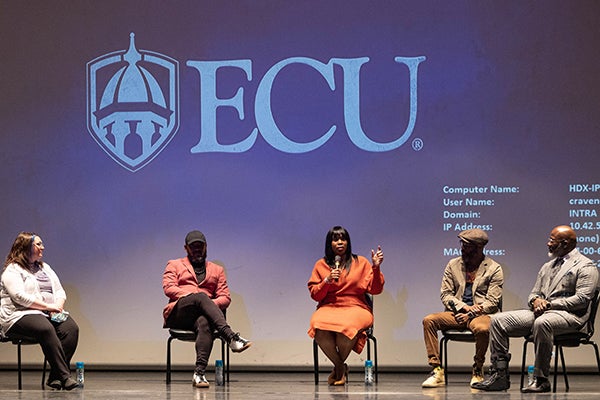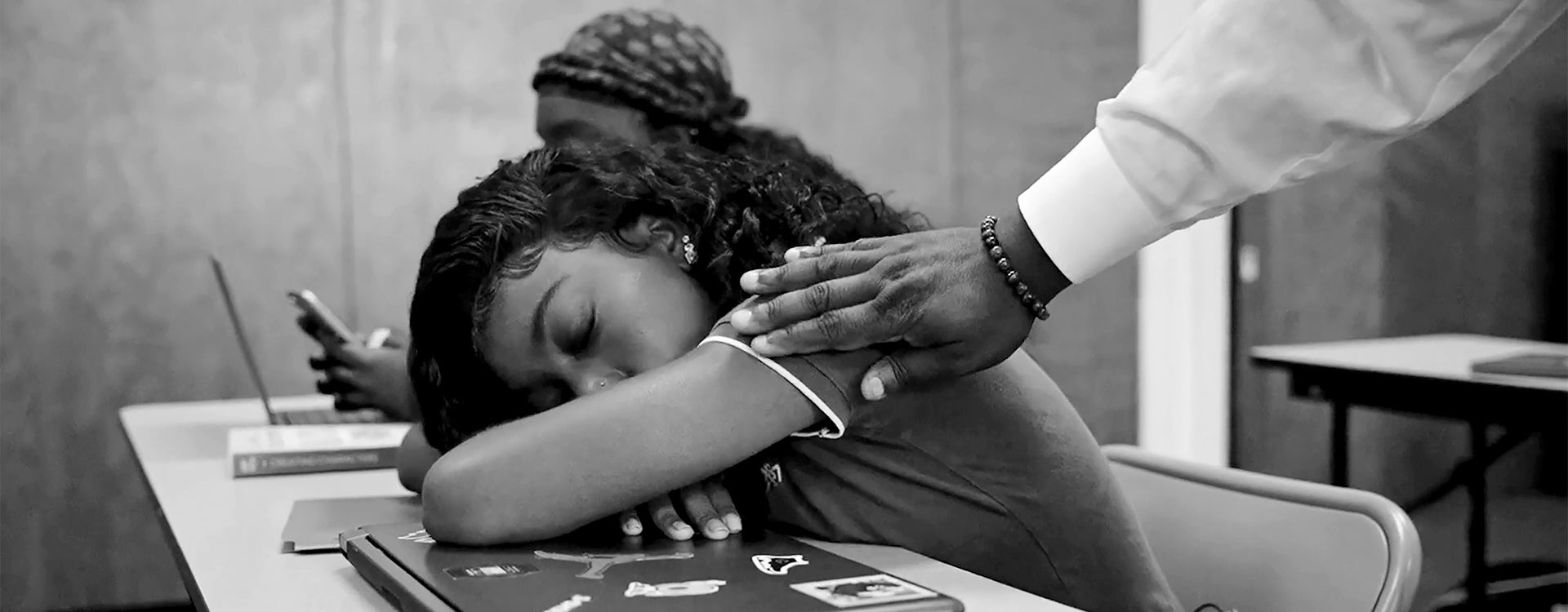HHP Film Festival sparks insightful reactions, conversations
In an emotional and purposeful public service announcement that lasts only 6 minutes and 43 seconds, Greenville filmmaker Deborah Sheppard strings together scenes that can spark hours of conversation.
The ECU College of Health and Human Performance welcomed those passionate, important conversations in a recent panel discussion following Sheppard’s “I Wish You Knew” short film that emphasizes traumatic, impactful situations often felt by Black children and calls for more trauma-informed schools and environments. The viewing of “I Wish You Knew” and subsequent panel discussion at Hendrix Theatre was a highlight of HHP’s annual prevention science initiative film festival held Feb. 3-4.

Panelists, from left, Dr. Erin Roberts, Jermaine McNair, Deborah Sheppard, Chris Charles and Garrett Taylor participate in a discussion at Hendrix Theatre during the HHP Film Festival. (Photo by Rhett Butler)
“We created the PSA for it to be a conversation starter,” said Sheppard, founder of the HeARToscope nonprofit agency that strives to transform hearts through the arts, and who is a victim advocate with the Pitt County Sheriff’s Office. “Sometimes we know we want to talk about certain things, but we don’t know how or where to start. For me, it was important to create some type of visual that resonated with people and pulled on their heart strings to get that conversation going. Writing a PSA I felt was perfect, because trauma has so many layers, and as you could see, we probably could have talked for hours.”
The other films shown during the festival were “Resilience,” “Unchained,” “Wisdom of Trauma” and “Mission Joy.” HHP also will host resilience trainings and trauma-informed faculty sessions as part of this year’s Resilient Pirate Nation initiative.
Filming of “I Wish You Knew” consisted of an 11-hour day, curating scenes that included a student not turning in their homework because they didn’t have working lights at home, a student who did not eat the previous night because all available food went to his younger siblings and a female discussing sexual and other abuse.
The film was a finalist in the inaugural Anthem Awards, earning silver recognition in the category of education, art and culture special projects.
Dr. Anisa Zvonkovic, dean of the College of Health and Human Performance, was pleased with collaboration efforts throughout the film festival.
“I was so delighted to witness the deep engagement with the material from members of the eastern North Carolina community during the panel,” Zvonkovic said. “I thought the attendees brought their expertise through lived experience to our event — from teachers to students to ECU faculty to community nonprofit directors. Such a rich set of folks all dedicated to be trauma-informed and to promoting environments in which students can thrive. …
“I really want to thank the filmmaker for her vision and generosity and the Resilient Pirate Nation co-directors, Dr. Jennifer Matthews and Dr. Erin Roberts, and their trauma and resilience initiative committee, composed of community and faculty members in HHP, for their good judgment, academic background and dedication to this work.”
According to Sheppard and Chris Charles, the “I Wish You Knew” director of photography, a major part of success was poise and precision by local students as actors. They all were acting for the first time.
“Every young person in that room was super comfortable with those lines and one of the things they all said was, ‘I know somebody like this,’ or, ‘I knew someone who has experienced five or six of these things that was written in the script,’” Sheppard said. “They said they just wanted to be able to use their voice to speak up for them. For me, that surpassed any level of acting skills. … It was also pretty awesome to text them and let them know you had never acted a day in your life, but you are now award-nominated actors and actresses.
“I know people celebrate me when they see the film, but to be honest, it was really just a vision. Those young people actually helped bring the film to life.”
Charles, a creative professional who grew up in Brooklyn, New York, was one of the panelists who provided personal insight and anecdotes.
“Having the academic knowledge to understand the inner workings of how trauma can be helped and fixed and resolved obviously is a super valuable skillset to have,” Charles said. “Not all of us know how to do that. All we know how to do is love. If you’re in the space of education, I think, and I’ve taught many classes and mentored many people, and that’s the first thing I lead with is love. Just to treat your students and your mentees and the young people you have under you with a certain unequivocal love and respect, and I think it will resonate.”
Discussion topics included the timing of trauma and resilience instances. Multiple panelists offered patience as a key element in developing moments of resilience.
“Sometimes there is a thought that if a traumatic experience happens to someone, that something will happen right away,” Roberts said. “I think what we have learned through research and what we have seen clinically is that (trauma) can impact people in so many different ways. It can impact their overall health, their physical health and their emotional health, their relationships with others. They might suddenly act differently with others, because they are carrying such a heavy load.”

A scene from the short film, “I Wish You Knew.”